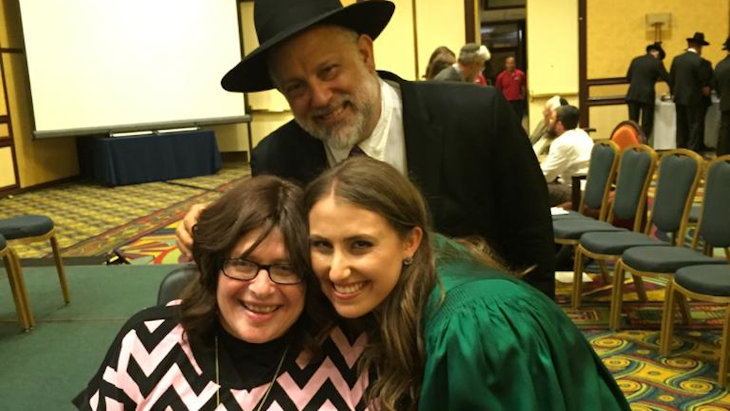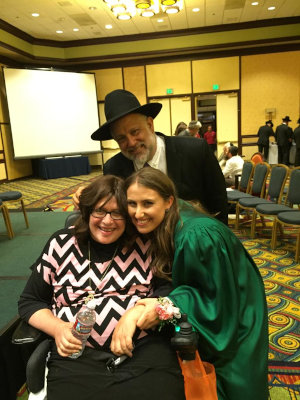 Raise a Glass to Freedom
Raise a Glass to Freedom


7 min read
Despite her degenerative and debilitating illness, Kaila Hollander’ remarkable joy inspired an entire community.
For years, Kaila Hollander was a fixture in her Los Angeles neighborhood, zooming around on her electric scooter and later, in her electric wheelchair. When asked by friends, “How are you?” Kaila, who had suffered from multiple sclerosis since her late 20s and by her 50s had become extremely physically debilitated, didn’t offer the typical and sometimes canned reply of “Baruch Hashem” – thank God. Rather, confined to her wheelchair, unable to walk and with one hand having lost all its dexterity, Kaila answered “So good!” She always had a smile on her face when she said it. It was a startling response, one rarely uttered even by those of us who enjoy the gift of good health and the full use of all our limbs.
Kaila’s trademark optimism, positivity, gratitude, humility, heartfelt faith in God, and determined independence even in the face of severe physical disability made her a beloved teacher, friend and role model in L.A.’s Jewish community. It was a great shock when she suddenly passed away in her sleep on July 3 at the age of 60.
I first met Kaila about 30 years ago on a Sunday morning when I had driven across town to attend some Torah classes for women. Childcare was provided, so I brought my toddler and infant sons with me. Suffice to say that the challenges of getting two little ones ready and out the door early in the morning for the short journey had left me nearly frazzled by the time I arrived. Kaila was one of the teachers and was the first to see me come inside, holding a car seat carrier with my baby crying inside and a look of despair on my face.
She rushed over to me and said, “You have no idea how much reward you have for just making the effort to get here this morning. Even if you can’t stay in the classes it will be as if you did and learned that Torah.” Her expression and tone were so heartfelt, and they were exactly what I needed at that frustrating moment. My baby did not, in fact, like the childcare situation, and I darted out of the class several times to sooth him, keeping Kaila’s words in my mind. Without her supportive words I would have left in tears.
Over the years, I would see Kaila at various community events and simchas, feeling so sad at her obvious physical decline. But she had true joy in life. Not only was she always smiling, but she exuded true happiness at seeing me. She was quick to compliment me on a recent article or book of mine she had read. Her praise seemed almost over the top, but she was completely sincere. And she was equally sincere in her joy at seeing other people and in calling attention to their talents, which she took pleasure in praising. “She made everyone feel like a million bucks,” said her son Yudi, speaking at her funeral.
Elena Polyak-Duke was one of those people whose life Kaila touched deeply. Kaila became Elena’s mentor through Partners in Torah (PIT) after Elena returned from a women’s trip to Israel in late 2018 through the JWRP, now called Momentum. Elena was shocked to see the news of Kaila’s passing on her Facebook feed.
“I wouldn’t believe it,” she recalled. “I was in shock.” Elena’s bond with Kaila began unexpectedly because Elena had specified three conditions for a PIT teacher: The busy wife, mother, teacher and community volunteer and who lives in Toronto wanted a teacher who lived nearby so they might meet from time to time and not learn only over the phone. She wanted someone close to her age, and someone whose religious observance level was similar to her own.
Kaila didn’t match any of my criteria, but we hit it off from the first phone call. We were the perfect match.
“Kaila lived in Los Angeles, was significantly older than me, and was Orthodox. She didn’t match any of my criteria, but we hit it off from the first phone call. We were the perfect match,” Elena recalled. They began learning Pirkei Avot (Ethics of the Fathers), going at a comfortable pace for Elena. Then Kaila suggested they study the book Positive Word Power, by Chana Nestlebaum.
Elena was struck by the fact that the weekly lessons in the book dovetailed remarkably with situations she was dealing with in her personal life. “Our lessons together always brought clarity about what I should do or not do,” she observed. Elena credits her relationship with Kaila and the insights she learned with becoming more cautious with words and not jumping to conclusions or judging situations quickly.
“We had a strong connection, and I loved Kaila and her energy so much. She was my mentor and role model. I’m trying to make sense of her loss for myself. She gave so much to me and I can still hear her voice,” she said.
 Kaila, her husband, and their daughter Aidel at Aidel's high school graduation in 2016.
Kaila, her husband, and their daughter Aidel at Aidel's high school graduation in 2016.
Robin Goldberg, one of Kaila’s closest friends, observed, “Kaila really actualized her potential. She filled her days with prayer, teaching, study, going to social events or errands, and being a wife, mother, grandmother, and friend.”
It is one thing to endure the “normal” range of difficulties that life throws our way and try to accept them with grace, fortitude, and faith. It is quite another to face those difficulties in addition to living with a painful, degenerative illness such as multiple sclerosis, which inexorably robs the body of its functions, and when asked how you are doing, to answer with complete sincerity, “So good!”
This nearly incomprehensible level of gratitude and faith explains why many who were closest to her considered her as much angel as flesh-and-blood woman, a messenger sent to support and inspire us. As Elena discovered through studying each week with Kaila, an intimate bond is created between Torah student and teacher. “Not many people I know have bonded with a Torah teacher like I did. I know I was blessed,” Elena said of her sense of loss.
Elena posted a photo of Kaila on Facebook, writing, “I’m heartbroken and sad. She was such a beautiful person and such an important part of my life. I have always been open with anyone who asked me about #PartnersInTorah & how amazing an experience it’s been for me. Kaila focused on my interests in what I wanted to learn and the latest of what we studied was from the book “Positive Word Power” – the words we speak and Torah’s Wisdom on Human Interaction. Kaila enriched my life. May her memory always be for a blessing and may her neshama have an aliya. May all of the Torah studying we did together live on in my family and have rippling effects carrying forth Kaila’s legacy.”
For now, when Elena is faced with certain ethical or moral dilemmas, she stops and asks herself, “What would Kaila do?”
Kaila Menucha bas Dovid Yitzchak is survived by her husband, Rabbi Tzvi Boruch Hollander, children Dovid Mordechai, Eliezer, Mayer Simcha, Yehuda Nosson, Aidel Miriam Feldstein, and twelve grandchildren. A fund has been established to help the family pay debts accrued during the lengthy illness of Mrs. Hollander. Donations can be made at https://thechesedfund.com/hollander/fund.

Sending you prayers, I was diagnosed in 2010 and seemed to go down hill quickly. In six years I could no longer work and had real problems with balance and joint pain. Brain fog was really bad sometimes. I took rebif and had a lot of problems and had to quit. I have been on techfadera (not spelled right) for a few years and have several side effects. I felt lost and decided to quit my meds due to side effects. Our care provider introduced me to Ayurvedic treatment. I had a total decline of all symptoms including vision problems, numbness and others. Sometimes, i totally forget i ever had MS. Visit Natural Herbs Centre web-site naturalherbscentre. com. I am very pleased with this treatment. I eat well, sleep well and exercise regularly. God bless all MS Warriors